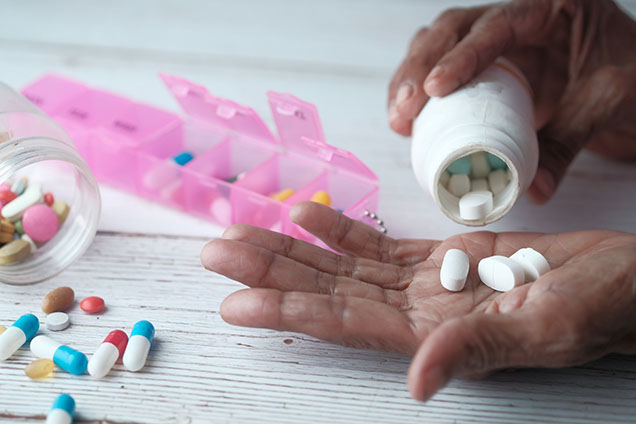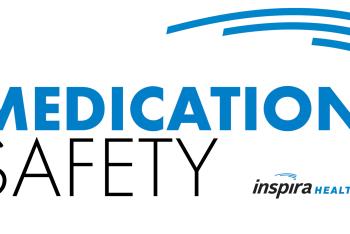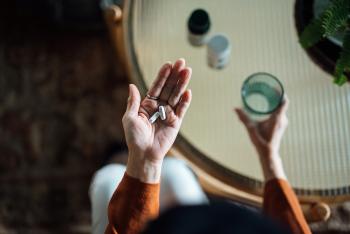More than 100 South Jersey residents have filled over 300 prescriptions – free of charge – at two...
Read More

In 2020, drug overdose deaths rose almost 30 percent and the United States saw the most opioid overdose deaths in a year, according to the Centers for Disease Control and Prevention (CDC). “During the pandemic, our overall wellness suffered. There were rampant uncertainties in our lives, leading to a lot of angst and anxiety—and many people began looking for ways to escape,” said Joseph Alessandrini, R.Ph., F.A.S.H.P., vice president of Clinical Services at Inspira Medical Centers Elmer and Vineland.
One tool available to health care providers in the fight against substance abuse is the Deterra Drug Deactivation System, a solution for safe disposal of unused prescription drugs available to providers for free across Inspira’s service area.
The Deterra Drug Deactivation System makes it easy to safely dispose of prescription drugs. Simply place unwanted medication capsules, liquids or patches in the bag containing activated charcoal that bonds to pharmaceutical compounds. Then, add warm tap water to activate the compound, seal the bag, shake it gently and dispose of it in a normal trash receptacle.
“Once the mixture hardens, the drugs are inactive—even if someone were to cut the bag open and attempt to obtain the medications, the ingredients are no longer active,” said Alessandrini.
When patients receive a prescription for pain management or post-procedure care, they may be tempted to throw unused pain medication into the garbage or flush it down the toilet. This can have harmful effects on the environment and increase the risk of medications being misused if found. “Prescription medication that’s disposed of in the garbage can get into the wastewater stream, and purification plants can’t always remove every chemical present,” said Alessandrini. “In addition, it’s not uncommon for substance abusers to rummage through trash looking for unused drugs.”
It’s essential to advise patients, especially those taking multiple medications, on proper storage so their medications don’t get into the wrong hands. “The best place to store your medications is in a secure environment—not in the bathroom cabinet,” said Alessandrini. “Storing medicine in the bathroom is problematic for multiple reasons. Not only does it degrade the drugs because of the lack of temperature control and excessive humidity, it also puts your medications at risk for being stolen or misused in a private environment.”
When prescribing medication to patients, be sure to communicate safe storage and disposal methods. “Inform your patients that prescriptions should be stored and disposed of in a safe manner. You can even give them Deterra when prescribing medications, so they’re ready to use it whenever they need to,” said Alessandrini.
The best way for providers to address substance abuse with their patients is to first develop trusting relationships. “The better your relationship with a patient, the easier it will be to have these difficult discussions,” said Alessandrini. “And if you suspect a patient is abusing drugs, refer them to a social worker or behavioral health professional. We have experts in the area who are here to help.”
Inspira was the first major health network in the tri-state area to adopt the use of the Deterra Drug Deactivation System. “Inspira’s Foundation has purchased thousands of units for us to distribute as a community benefit, and we’re committed to getting this into the hands of providers and the community to protect the people we serve,” said Alessandrini.
Providers can request a supply of Deterra to keep at their office—either to distribute to patients upon request or to dispose of unused prescription drugs that patients bring in. Each pouch can accommodate 90 capsules, 12 fluid ounces or 12 patches. Deterra is also available for patients at Inspira’s retail pharmacy locations.
To request your own supply of Deterra, visit inspirahealthnetwork.org/deterra or call (856) 575-4130.

More than 100 South Jersey residents have filled over 300 prescriptions – free of charge – at two...
Read More
In recognition of World Patient Safety Day, we've asked some of our own pharmacy experts to share...
Read More
Almost everyone uses medications to prevent or treat illness, but they can cause significant issues...
Read More
The material set forth in this site in no way seeks to diagnose or treat illness or to serve as a substitute for professional medical care. Please speak with your health care provider if you have a health concern or if you are considering adopting any exercise program or dietary guidelines. For permission to reprint any portion of this website or to be removed from a notification list, please contact us at (856) 537-6772